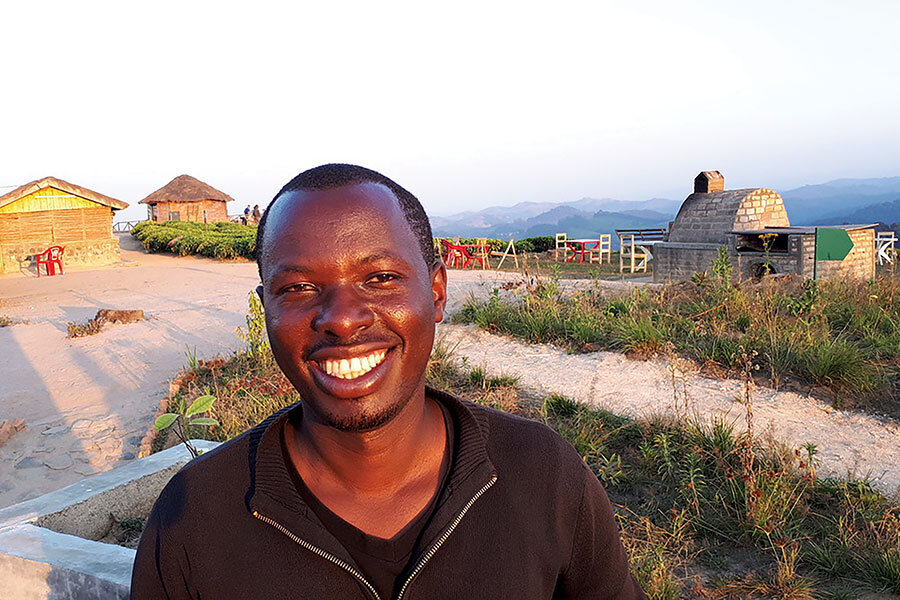One Rwandan's surprising idea to protect wildlife: Recruit poachers
Loading...
| Kitabi, Rwanda
At long last the killing stopped.
As a boy growing up in the late 1990s after genocide, Emmanuel Mugendashyamba ventured into the protected rainforest near his home, a mountainous region in Rwanda’s southwest. How many days had he and his father spent illegally hunting antelopes and wild pigs to get food for the family? Or killing monkeys to sell precious skins? They also cut wood for heat and set swaths of the forest on fire to reach beehives and steal honey.
Amid the desolation that followed the massacre of some 800,000 people, mostly minority Tutsis, poaching was often a matter of survival. Locals like Mr. Mugendashyamba as well as refugees returning home after the violence ate away not only the Nyungwe Forest, but also Rwanda’s two other protected national parks – Akagera in the east and Volcanoes to the north, home to endangered mountain gorillas.
Why We Wrote This
After the genocide in Rwanda, survivors turned to poaching for survival. Ange Imanishimwe made it his life’s work to show poachers their livelihood lies in preserving, not destroying, the forest.
Mugendashyamba’s destructive threat could have gone on longer had a local forest guide named Ange Imanishimwe not confronted him. Their paths crossed at the entrance of the Nyungwe Forest five years ago when Mr. Imanishimwe overheard Mugendashyamba talking about poaching.
“Ange said, ‘Why are you killing animals?’ ” recalls Mugendashyamba, a soft-spoken man. “Don’t you know we all belong to the same planet?”
Imanishimwe didn’t stop there. You don’t have to destroy the forest to survive, he said. There are alternatives. For instance, the nonprofit group that he had just created was aiming, precisely, at enlisting poachers like Mugendashyamba to help preserve the forest and the region.
That’s how Imanishimwe gave Mugendashyamba a job with his group Biocoop.
Mugendashyamba is one of 600 residents in and around Kitabi, Rwanda, whom Imanishimwe has hired to boost conservation and ecotourism near the Nyungwe Forest, among the largest mountain rainforests in East-Central Africa. From heights that offer stunning views of lush forest and green hills with tea plants, Imanishimwe works to reduce poaching, involve villages in conservation, and open this hard-to-reach corner to residents and tourists.
“My goal is to eradicate extreme poverty and malnutrition in Rwanda by creating 1,000 green jobs every year,” says Imanishimwe. “When we started giving jobs, we started with those who were poachers before.”
If Imanishimwe reaches out to locals such as Mugendashyamba, it’s in part because he speaks their language. Like so many Rwandan children, he knew some of his school friends were slaughtered because they belonged to the “wrong” ethnic groups. And he had to quit school because his parents could no longer afford the uniform.
But while Mugendashyamba’s family and others turned to poaching, Imanishimwe made a pact with himself: to devote his life to protecting nature in his native region, the Kitabi area. Seeing children destroy nests and torture birds had sealed his decision. Later, when a scholarship enabled him to resume school, “I said, ‘I got this opportunity, and now I want to give something back to my community,’ ” he says.
Launching his nonprofit and ecocenter
With a zoology and biodiversity conservation degree in hand, he became a forest guide and naturalist at the Nyungwe Forest. Then, after being named Rwanda’s top young innovator in 2012, he used the prize money to create Biocoop. Last year Imanishimwe broadened his vision and set up the Kitabi EcoCenter, a camping site at the top of one of Rwanda’s highest and most scenic mountains that combines ecotourism with his conservation projects.
Although he toured the world in search of grants, it was here in the Kitabi region that he found one of his closest allies. He teamed up with Craig Conard, a pediatrician from New Orleans, who was working to prevent malnutrition at a nearby hospital. When Dr. Conard saw the site of the future ecocenter, he “fell in love with the place” and gave time and money to the cause. “At the end of the day, preserving the culture, helping the people, and conserving the environment of that special place is the most important, and something we have to do,” Conard says.
Imanishimwe’s vision has drawn interest far beyond the borders of this country. He was one of 100 young African leaders invited to the United States in 2015 as part of an initiative, during which he caught then-President Barack Obama’s attention during a heated discussion on climate change. It’s a moment he shares via YouTube, not without pride.
And this summer, in a partnership addressing biodiversity and endangered species in the Nyungwe Forest, a delegation from Germany visited to study Imanishimwe’s model.
‘Filling in a gap’
The bustling Rwandan capital of Kigali, at least five hours away by bus, showcases how this nation has turned into one of Africa’s fastest-growing economies, some say. But the sparkling paved roads out of the city have yet to reach Kitabi, revealing how much remains to be done.
Imanishimwe is playing his part in the renewal of the region as well as the country, says Eric Rukinga, a financial administrator responsible for 20 villages in the Kitabi area.
When Mr. Rukinga’s family returned to Rwanda in 1994 after decades in exile, it found a country “where hope was dead.” He adds, “Young people didn’t want to get involved.” But now, Imanishimwe is “filling in a gap,” engaging locals in various tasks.
“In 1994, young people mobilized to destroy our country, and now young people are mobilizing to rebuild the country,” says Rukinga, soaking in the views during his lunch break at the Kitabi EcoCenter. “That gives me hope.”
When young people need training or a sense of direction, Rukinga connects them to Imanishimwe. “I explain to them how Ange made it that far,” he says. The success of the ecocenter has prompted similar tourist base camps to open up, Rukinga says.
Imanishimwe’s focus on conservation comes alongside increased government awareness of the economic importance of harnessing the opportunities offered by Rwanda’s protected national parks. After long neglect, numerous initiatives have emerged in recent years to combat poaching, reforest the country, and educate guides who can teach the benefits of biodiversity.
But for many struggling villagers, the initiatives can feel remote, theoretical. “Those people had felt let down,” says Patrice Nzamuye, a former warden at the Nyungwe Forest who now works for a company that harvests pine, cypress, eucalyptus, and acacia in a buffer zone around the forest to limit encroachment. “Ange is making them understand that even if they never understood the importance of the forest, it’s time now for them to know that the forest generates money and that the money is being allocated into the community.”
Mugendashyamba, who first worked for Imanishimwe as a “walker” clearing invasive species, is now a “man for everything” at Biocoop. Charged with anything from taking care of the base camp’s chickens to setting up visitors’ sleeping quarters at the Kitabi EcoCenter, the poacher-turned-nature-protector has a roof over his head and a salary to feed his two children.
“And I’m telling other poachers they don’t have to kill animals to survive,” Mugendashyamba says on a cold night as he keeps alive a bonfire for those who are enjoying locally made ginger carrot soup.
Other groups protecting animals
UniversalGiving helps people give to and volunteer for top-performing charitable organizations around the world. All the projects below are vetted by UniversalGiving; 100 percent of each donation goes directly to the listed cause.
• Merazonia runs a wildlife rescue and rehabilitation center on 250 acres of Amazon rainforest in Ecuador. Take action: Financially support the renovation of this organization’s clinic.
• Osa Conservation applies scientific and other expertise to safeguarding the biodiversity of the Osa Peninsula in Costa Rica.
• Romania Animal Rescue aids animals from poor areas, with a focus on spay and neuter services. Take action: Make a donation to support this organization’s Homeless Animal Hospital Project.






